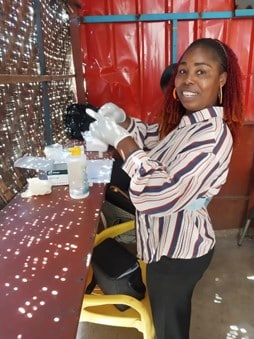Laurinda, a 39-year-old mother of nine, faced a dramatic challenge when she discovered she was HIV-positive while four months pregnant with twins. Originally from Huambo province, Laurinda was living in Luanda, Angola’s capital, when she was first diagnosed with HIV during an antenatal care visit, and immediately began antiretroviral treatment (ART).
However, adhering to her treatment proved difficult. After the birth of her twin girls, Laurinda’s partner passed away, and her mother-in-law evicted her and the twins. Overwhelmed and feeling abandoned, Laurinda stopped her treatment.
“I abandoned treatment because the difficulties I was facing were too many,” Laurinda shared. “I would go more than 24 hours without eating anything and I did not have a job, and therefore, I had no money to get to the health facility.”
Laurinda’s story highlights how difficult family circumstances can inhibit one’s ability to maintain lifesaving health treatments. However, with support from the President’s Emergency Plan for AIDS Relief (PEPFAR) through the US Agency for International Development (USAID), the Reaching Impact, Saturation, and Epidemic Control (RISE) program in Angola is helping families like Laurinda’s find a pathway to consistent HIV care and a second chance at life.
After months of struggling, Laurinda found the courage to contact her aunt Augusta, a traditional birth attendant (TBA) who lived in Huambo and agreed to help Laurinda move back to her hometown when the twins were 10 months old. Augusta had recently attended a meeting convened by RISE Angola to foster a referral partnership between RISE HIV community counselors and TBAs. Based on what she learned at the meeting, Augusta knew that Laurinda’s twins could be at risk for HIV since their mother was not on treatment, and the twins had not yet been tested for HIV.

Amelia prepares to collect DBS
Augusta referred her niece to RISE HIV community counselor Amelia Nafulo Kuyungo, who had just been trained on dried blood spot (DBS) testing, which is used to test infants for HIV. The training is part of a pilot project between RISE Angola and the National HIV and AIDS Institute (INLS). The project enables lay counselors like Amelia to collect DBS samples directly in communities rather than only in hospitals or laboratories. Huambo was selected for the pilot because its coverage of early infant diagnosis (EID) was just 36 percent, the lowest of the four provinces supported by PEPFAR. A month after the pilot began in April 2024, 29 samples from infants had been collected in the community, 24 (82 percent) of which were from infants less than two months of age.
At the end of April, Amelia traveled to Laurinda’s home, collected the DBS samples from her twins, and immediately brought Laurinda to CS Benfica Baixo, one of the four ART health facilities in Huambo supported by PEPFAR, to re-initiate ART. Given the precarious economic conditions in which Laurinda was living with her children, RISE also provided food baskets for the family and advocated for more support from the provincial public health team. By the end of May, the test results for the twins came back negative, bringing immense joy to the family and their community of supporters.
“The help that I am receiving now means a lot to me,” Laurinda said. “I really do not have words to express my gratitude. The food baskets have allowed me to introduce the twins to other foods and minimize their exposure to the virus [through breastmilk].”
The DBS samples from Laurinda’s twins were the fourth and fifth samples Amelia had collected after her training.
“It is a huge responsibility, but I do it happily,” Amelia reflected on her DBS work. “Some of the infants are from mothers that I have been supporting since early in their pregnancies, so being able to now offer DBS to them is great because it gives me more autonomy to ensure that mother and child are well taken care of. I now can address the common problem that many mothers have, which is the lack of money to get to and from a health facility to bring their infants in for testing before they turn two months of age.”
Through RISE Angola, Laurinda and her twins will continue to be closely supported by Amelia until the twins are 18 months old and Laurinda’s health has stabilized.
RISE Angola, INLS, and PEPFAR’s laboratory partner AFENET meet twice a month to monitor the pilot’s results, which is expected to last through September 2024. Based on the results and lessons learned, RISE Angola hopes to expand the pilot to other provinces.
“The joy that I feel when I find four- and six-week-old babies that need our support fills me with pride,” Amelia said. “I am convinced that we will continue to find and help many more.”
About ICAP
A major global health organization that has been improving public health in countries around the world for two decades, ICAP works to transform the health of populations through innovation, science, and global collaboration. Based at Columbia Mailman School of Public Health, ICAP has projects in more than 40 countries, working side-by-side with ministries of health and local governmental, non-governmental, academic, and community partners to confront some of the world’s greatest health challenges. Through evidence-informed programs, meaningful research, tailored technical assistance, effective training and education programs, and rigorous surveillance to measure and evaluate the impact of public health interventions, ICAP aims to realize a global vision of healthy people, empowered communities, and thriving societies. Online at icap.columbia.edu







